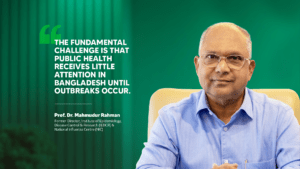The Prestige asked him a few questions regarding supplychain, blockchains and opportunities in Bangladesh. These were his answers.
1) We want to know a bit about your academic background and how you started your career:
My childhood included switching schools often, both in Bangladesh and abroad, due to my father’s profession in the Navy. I attended Church School, Summerfield, and SEMS, to name a few. I spent my college years in Malaysia and Singapore. From an early age, I demonstrated an aptitude for science and engineering, which ultimately culminated in my pursuit of education at MIT in the US. This education enabled me to kickstart my career in research and technology. I believe my diverse experiences in various educational institutions prepared me for the type of work I am interested in doing.
2) If we were to ask you to list out your top 3 Golden Rules that you follow in your career, what would they be?
Strict discipline, perseverance, and the constant pursuit of knowledge are the three rules I follow rigorously. I believe that without relentlessly taking initiatives and cultivating awareness through a set of principles, it is difficult to remain part of the positive growth curve. Following these rules has consistently worked for me and has delivered results that propelled my career to the next stages.
3) What differences do you see between the startups in Bangladesh and Silicon Valley?
If you were to ask me this question about five years ago, my answer would have been entirely different. However, as we approach 2020, Bangladesh’s overall startup ecosystem has developed significantly, with large numbers of entrepreneurs, engineers, startup hubs and accelerators emerging from the country. Furthermore, the convergence point of market opportunities and market access is at its prime now in Bangladesh. However, the areas where I feel Silicon Valley trumps Bangladesh are in research, ease of businesses, hard skills from engineers, and access to capital.

4) What possibilities does Bangladesh have on the blockchain frontier?
Bangladesh is what I call a “Transformative Market” in Blockchain. In fact, in my recent paper with the World Bank, I termed countries such as Bangladesh as being at the inflection point of massive growth potential. In other words, it’s a sheer combination of market needs, size, and youth population who are poised to tackle the challenges of cost and lack of existing infrastructure and market opportunities. I see short term implications in industries such as finance, governance, supply chain, and real estate/housing, among others. In the long term, the entire market of Bangladesh is poised to capture a massive portion of the global blockchain industry, which is intermittently connected to other sectors.
5) How much is Bangladesh lagging behind in cybersecurity sector compared to the rest of the globe?
I think the critical point here is to holistically understand the definition of cybersecurity. For years, it was assumed to be a reactive measure and process versus a proactive one. In today’s world, long gone are concepts of standalone cyber attacks; instead, cybersecurity has transformed into long term cyber attack strategies. That means, there are “soft attacks” and “hard attacks” which are all designed to suit a long term strategy. We have noticed cyber meddling in international politics, finance, and critical infrastructure. As Bangladesh is transforming rapidly, it is vital to assume digital cyber infrastructure strategy and critically evaluate sectors such as Cyber-Sovereignty, which comprises Identity Management and Protection, and legal and regulatory frameworks, among others. Once these sectors are tackled, then we can consider the aspects of Cyber Censorship and Surveillance, which follow critical guidelines to avoid infringement of public rights to privacy.
6) Your favorite book that taught you the most important lessons in life:
It’s difficult to pinpoint just one, but I found 21 Lessons for the 21st Century by Yuval Harari to be a valuable and insightful book. Notably, the chapter that states, “Life is not a story, but it yearns for meaning,” made me deeply ponder my own life’s meaning.

7) Which untapped market in Bangladesh tempts you the most?
Almost all market sectors of Bangladesh, whether tapped or untapped, are promising with the potential to mature at new levels. My personal preference would be areas of finance, real estate, and the supply chain.
8) What is your opinion on the “brain drain” that happens in Bangladesh?
In my opinion, the brain drain is not only a massive problem and unfortunate loss for Bangladesh, but also its most significant underachievement. Intellectuals leaving the country are propelling billions and in the future triillions of dollars worth of foreign companies and organizations, meaning a huge economic deficit for Bangladesh that counters its high growth potential. The lack of a system based on merits plays a critical role in this phenomenon, with failure from all sectors to create rewards and opportunities for intellectuals in the country. However, this situation can be easily converted into a “brain gain” as can be witnessed in neighboring countries such as India recently and Singapore for a while. I can attest that, as a Bangladeshi, my heart will always yearn for my country’s success, and I believe this yearning is shared by my fellow expats. Differences are a natural part of the human ecosystem, but our leaders and thinkers need to align incentives that ensure growth for all and increase our country’s possibilities for success. Developing long term strategies to propel the nation to new heights, thus can act as a solid ground for consensus.
9) Do Bangladeshis have what it takes to be employed by companies like Google, Amazon, and Facebook?
Absolutely! All these companies have various hiring methods; it is a known fact that Google hires employees based on their internet activities. They have the most extensive digital resources and infrastructure at their disposal, which enables them to pinpoint their preferred employees.
While a decent number of Bangladeshi engineers already work in these companies, the number could be far higher if more attention was paid to their detailed processes and requirements. In other words, we need to train and prepare our skilled human resources to a particular niche that is indispensable to these employers. I disagree with the concept of a discounted workforce, as I believe there is no substitution for quality. If we can prepare our next generation’s workforces to pay attention to quality, we can set the terms with these employers and even build local organizations which could potentially compete with them.
10) What prospects of the innovation ecosystem are you currently working for and how? Please elaborate.
I currently manage technology investment funds and provide strategic support, through means such as technology consultancy and development programs, to governments and Fortune 100 companies. Additionally, I spend a significant portion of my time on research and development, which is my core area of expertise.

11) Drawbacks of starting a new venture in Bangladesh:
Among other hurdles, the lack of transparency and merit-based system I mentioned earlier, combined with the difficulty of running business operations, the disparity between the cost of living and income, and poor transportation and communication infrastructure represent some crucial impediments to creating successful ventures.
12) How can AI change the future for Bangladesh?
At the World Economic Forum Jack Ma made a powerful statement:
“Let us prepare our next generations with skills and techniques which a machine can never emulate.”
AI is posed to be a catalyst of processes and systems enhanced by human activities, and it provides us the opportunity to skip over cumbersome and/or expensive methods of optimizing products and services. In a small and densely populated area such as Bangladesh, AI can have massive implications by enhancing and simplifying processes everywhere from public sectors (e.g., transportation and communication) to private sectors (e.g., fintech, regtech, and the stock market) to the supply chain (e.g., inventory and goods management).
13) One piece of advice that you will never forget:
I will never forget the the advice my late grandfather, who was a scientist, my role model, and my best friend gave me as a young boy:
“Seek knowledge. Pursue an understanding of the interconnectivity of life, science, and the universe, and your pursuit will present you with one challenge after another.”
14) Where do you see yourself in the next 5 years?
That’s a tough one, as there are so many external variables to account for; however, I intend to continue following the three golden rules I operate with regularly and will wait for the future to unfold itself. My long term vision is to halt the demise of human civilization by pursuing advancement in science and technology. To facilitate this, I will be tracking my results based on my daily work and the investments I have made in diverse portfolios.
15) A bad habit that you are trying to get rid of:
I feel I have an inherently driven personality that leads to being a workaholic. Unfortunately, I have trouble maintaining a work-life balance, but I intend to tackle this imbalance so I can spend valuable time with my peers and loved ones.
16) Your advice to young entrepreneurs:
Dream big, start small and work towards your goal regularly. Ultimately, you will see the results in due course of time. In life and business, there are no short-cuts.
Remember, if you have somehow succeeded with your short-cut, you have probably cut short your growth opportunities. Also remember that not everything can be evaluated in financial terms; hence, always look for opportunities to grow and learn, that is the best investment you can make in yourself.






